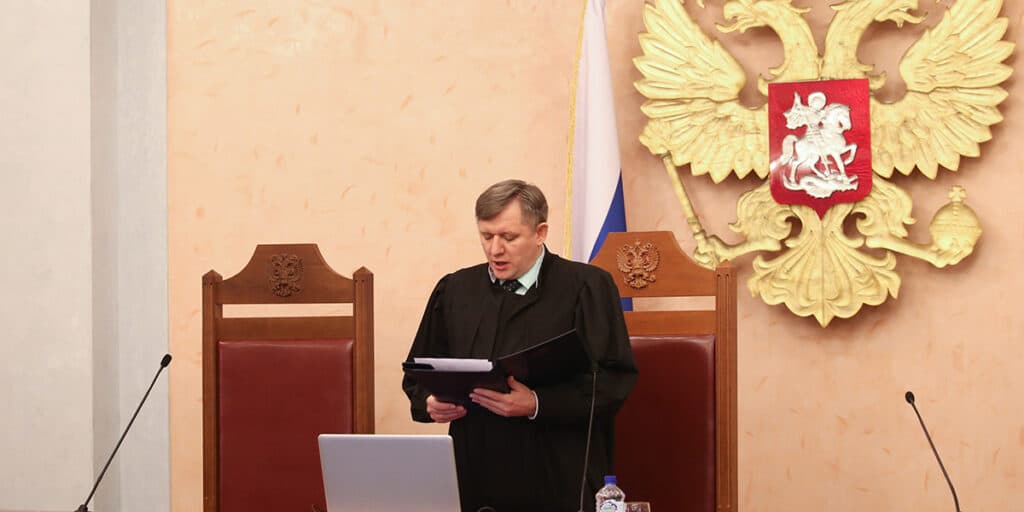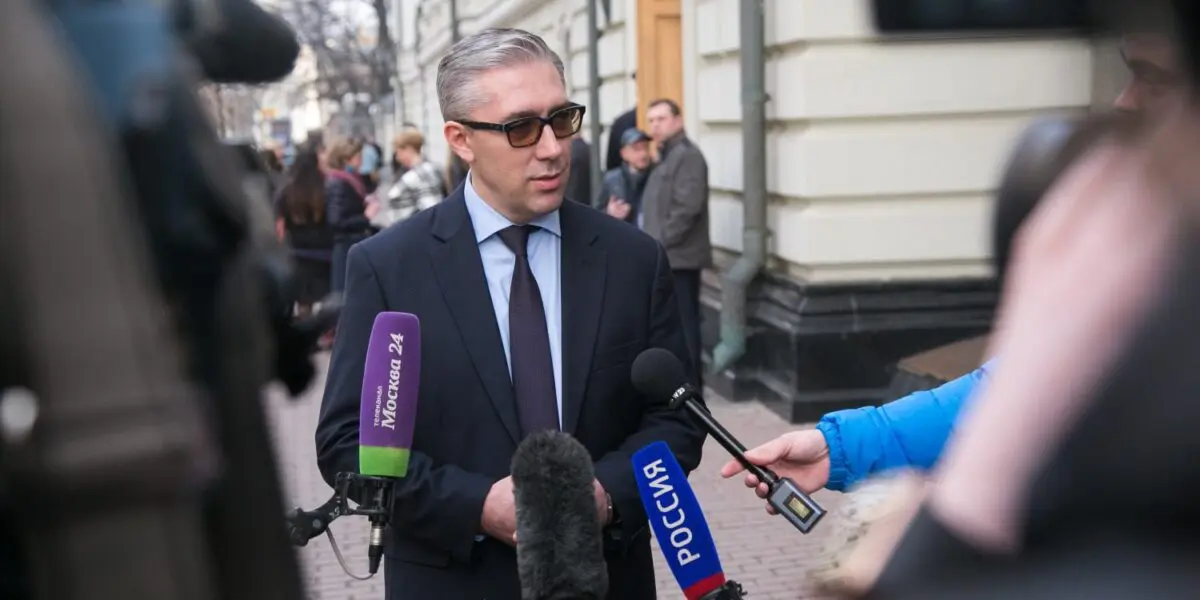JW World Headquarters (20.04.2022) – April 20, 2022 will mark five years since Russia’s Supreme Court criminalized the activity of Jehovah’s Witnesses, liquidated some 400 of their legal entities, and confiscated their houses of worship. Russian authorities have since jailed over 320 Witnesses, with over 80 still in prison.
The systematic persecution has escalated over the past year as prison sentences exponentially increased in frequency and in term length. Several Witnesses have also been tortured or severely beaten either while being interrogated or in prison.
Jarrod Lopes, spokesman for Jehovah’s Witnesses, states:
“It’s well-documented that Jehovah’s Witnesses endured decades of Soviet persecution. Ignoring this history, Russian authorities have inhumanely beaten, tortured, and imprisoned peaceful Jehovah’s Witnesses in a failed attempt to break their faith and eliminate them. Long after the Soviet regime fell, Jehovah’s Witnesses have continued to thrive and they will likewise outlive the current Russian administration.”
Below are the latest statistics as well as some quotes from international experts that you will find helpful if you chose to report on the anniversary of the ban.

2017 Russian Supreme Court Ruling
· The April 20, 2022, Supreme Court ruling, albeit grossly unjust, simply liquidated all of the Witnesses’ legal entities, Local Religious Organizations (LROs), in Russia and Crimea, declaring them “extremist”. During the 2017 Supreme Court hearing, the Russian government claimed that individual Witnesses would be free to practice their faith. However, the government’s claim of allowing freedom to worship has been inconsistent with its actions.
o Additional references (link1; link2)
Home Raids, Criminal Cases, and Imprisonment
· 1741 homes of Jehovah’s Witnesses have been raided, almost one per day
o 27 homes raided since February 24th Ukraine invasion
· 620 JWs involved in 289 criminal cases
o This includes 16 JWs in Crimea, 4 of whom are in prison (some after conviction have been transferred to prisons inside of Russia). All have been charged under prevailing Russian law
o Oldest involved in a criminal case is 87.5-year-old Yelena Zayschuk, she is 1 of 6 in their 80’s; there are 34 in their 70’s
· 88 total in prison, over 325 have spent some time behind bars
o 24 convicted and sentenced to prison
o 64 in pretrial detention facilities awaiting conviction or have been convicted but awaiting results of first appeal
o Longest time spent behind bars:
§ Dennis Christensen, since May 2017 (serving 6-year sentence)
o Longest, harshest prison sentence
§ Male: 8 years—Aleksey Berchuk, Rustam Diarov, Yevgeniy Ivanov, and Sergey Klikunov
§ Female: 6 years—Anna Safronova
§ In comparison, according to Article 111 Part 1 of the Criminal Code, grievous bodily harm draws a maximum of 8 years sentence; Article 126 Part 1 of the Criminal Code, kidnapping leads to up to 5 years in prison; Article 131 Part 1 of the Criminal Code, rape is punishable with 3 to 6 years in
§ The terms escalated in 2021. Previous years the maximum sentence was 6.5, but in 2021 it jumped to 8 years, as noted above
§ Number of prison sentences annually steadily increased: 2019-2, 2020—4, 2021—27
o Oldest
§ Female: Valentina Baranovskaya, 70 (2-year sentence)
§ Male: Vilen Avanesov, 69, (6-year sentence)
· Over 450 added to Russia’s federal Rosfinmonitoring list of extremists and terrorists
o Many are placed on the list even before being criminally charged or tried—see Forum18
Beatings and Torture
For example:
· February 2019, Surgut, seven men tortured—suffocated, stripped naked, doused with water, and given electric shocks to their genitals—Link to confirmed report. Video interviews
· February 2020, Chita, one man beaten, choked, and given electric shocks to his stomach and leg—link to report
· February 2020, Orenburg, five men severely beaten in prison, with one man being hospitalized for broken rib and damaged kidney—link to report
· October 2021, Irkutsk, one man beaten while his wife screamed for them to stop, another was tortured—stripped naked, lifted and suspended off the ground by his arms behind his back, attempted to force a glass bottle in anus area—link to report. Video interviews
As if torturing a man and making him writhe in pain isn’t savage enough, many Russian officers will also resort to inhumanely threatening to have his wife raped.
· Why and how successful is it?
o Most often, Russian law enforcement officers have beaten or tortured Jehovah’s Witnesses to force them to divulge information about fellow believers and or bully them into giving up their faith. The overwhelming majority of men withstood the torture and never complied, even with the smallest demands for information. That’s why in most of the criminal cases, the authorities have resorted to planting a mole to infiltrate the congregation and leak the names, contact information, and worship activities of local Witnesses.
What Experts Are Saying
Natalia Prilutskaya, Russia researcher at Amnesty International, call on Russia to:
“to immediately and unconditionally release all Jehovah’s Witnesses arbitrarily deprived of freedom for their faith and to drop criminal charges against all peaceful believers. Those who have been subjected to criminal prosecution, torture and other ill-treatment, unlawful searchers of their properties, who have lost their jobs, must receive adequate compensation and have their rights restored.”
The world should have started paying more attention to prosecution of Jehovah’s Witnesses in Russia already five years ago. Arbitrary prosecution of peaceful believers on spurious charges of “extremism” was and is a litmus test of the lack of freedom in Russia and of the Russian government’s intentions to quash any dissent, anything that they see as a threat to their official narratives. While the world was watching repressions against dissenters being unleashed within Russia, its government was also quietly preparing to promote their world view with tanks and missiles on the territory of the neighboring country, Ukraine. Were there a stronger international reaction to persecutions inside Russia, including to persecution of Jehovah’s Witnesses, the world could have been in a much better place today now. To prevent further escalation, it is important to expose and rigorously respond to human rights violations being committed in Russia. Restoring justice for one of the persecuted communities – Jehovah’s Witnesses – is one of the steps on the long road to restoring human rights and freedom in Russia and ensuring that no more international crisis, like the aggression against Ukraine, could be conceived in the Kremlin.”
Sir Andrew Wood, former British Ambassador to Russia (1995-2000), states:
“It follows that the punishment of peaceful believers on the grounds of their certification as extremists by the Russian Supreme Court in effect by demand of Russia’s current president is arbitrary and unjust. Their arrest, ill treatment, and confinement are a breach of elementary human rights together with the infringement of the freedom of all souls to seek their path to the truths of religion as best they may. The targeting of particularly vulnerable people of whatever gender or age adds to the injustice.”
“The people of Russia and those beyond them share an interest in the country’s future rule under the conditions of natural law. That is essential to its future beneficial evolution. The peaceful pursuit of religion is an essential element of that aspiration, whether in times of war like the present or in less dangerous circumstances. It therefore deserves our support as we hope and work for a better future.”
Dr. Emily Baran, expert on Russia and Soviet history, states:
“The history of Jehovah’s Witnesses, both in Russia and worldwide, makes clear that persecution will not have its intended purpose of eliminating this faith community. What persecution does is isolate Witnesses, subject them to cruel and senseless harassment, violence, and loss of freedom, and make their daily lives full of uncertainty. The Witnesses have demonstrated adaptability before, including in the Soviet period, and will continue to find ways to practice their faith even in these difficult conditions. Russian Witnesses will adapt because they have to, because they feel their faith requires it of them, and because repeated persecution has given them the skills to do so effectively.
More comments by the experts above can be downloaded here.
Russia Exporting Weaponization of Anti-Extremism Legislation
· Russia has been seeking ways to export its anti-extremism legislation, along with how to weaponize it
o May 2020, Putin signed a “Decree of the President of the Russian Federation”—“On Adopting a Strategy to Counteract Extremism in the Russian Federation Until 2025”
§ Section 32 on pg. 16, clearly outlines the President’s goals, in the field of international cooperation:
§ Strengthening the position of the Russian Federation in international organizations whose activity is aimed at counteracting extremism;
§ Promoting in bilateral and multilateral formats Russian initiatives in counteracting extremist activities, including over the Internet;
§ Signing agreements with foreign states aimed at solving problems in the realm of counteracting extremism;
§ Exchanging best practices in counteracting extremism, including cooperating together to develop international legal documents;
o Moscow-based rights advocate Sova Center published a report in 2020 confirming that
“Russian extremist legislation has been and remains the model anti-extremist legislation for Central Asian countries, despite the fact that, in recent years, it has been repeatedly criticized at the international level by UN High Commissioner for Human Rights Michelle Bachelet, the UN Human Rights Committee, the UN Committee on the Elimination of Racial Discrimination, the Venice Commission, the European Commission against Racism and Intolerance of the Council of Europe, and other structures






